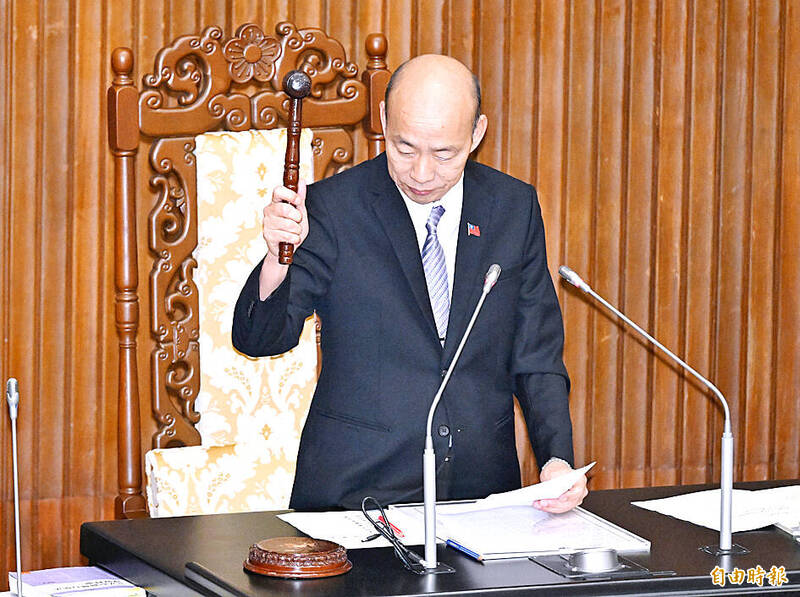《TAIPEI TIMES》 Regenerative medicine acts pass third reading

Legislative Speaker Han Kuo-yu bangs the gavel as the Legislative Yuan passes the third reading of the Regenerative Medicine Act in Taipei yesterday. Photo: Liao Chen-huei, Taipei Times
REGULATING USE: Therapies have to pass human trials, while non-healthcare facilities that practice or advertise regenerative medicine can be fined up to NT$20 million
By Lee I-chia / Staff reporter, with CNA
The Legislative Yuan yesterday passed a third reading of the Regenerative Medicine Act (再生醫療法) and the Regenerative Medicine Product Act (再生醫療製劑管理條例), which dictate that regenerative medicine can only be used after the completion of human clinical trials, with the exception of compassionate use cases.
Bills to address ethical and political issues surrounding the use of regenerative medicine had been discussed for about a decade until the Executive Yuan in April passed the newly revised versions and sent them to the legislature for review that same month.
With a cross-party consensus, the drafts last month passed a first review in the legislature’s Social Welfare and Environmental Hygiene Committee, before passing the third reading in the legislative chamber yesterday morning.
Under the Regenerative Medicine Act, regenerative medicine can only be used by healthcare facilities after completing human clinical trials, with two exceptions: for compassionate use and for regenerative technologies approved before the acts were passed.
Compassionate use is limited to people with a serious or immediately life-threatening disease or condition, for which Taiwan does not have other comparable treatments. It can include medicine, a medical device or technology, but xenogeneic cell therapy (using cells from a nonhuman source) is prohibited.
The act stipulates that the Ministry of Health and Welfare would announce criteria, applications, case number limits and ethical guidelines for compassionate use.
Non-healthcare facilities that practice regenerative medicine therapies or advertise regenerative medicine services can be fined NT$2 million to NT$20 million (US$61,740 to US$617,398) for each offense, and the government can confiscate the facility’s regenerative medicine devices and products, the acts state.
Healthcare facilities that apply regenerative medicine without completing human clinical trials can be fined NT$200,000 to NT$2 million.
The tissue and cell source for regenerative medicine should be limited to adults with full mental capacity, and if the cells are sourced from an incapacitated person, their legal representative or guardian’s consent form must be notarized, the act states.
It also formally legalizes the Guide on Moral Policies Involving Human Embryo and Embryonic Stem Cell Research (人類胚胎及胚胎幹細胞研究倫理政策指引).
The guide would ban regenerative medicine research involving embryos or embryonic stem cells, embryos created by artificial insemination, the creation of hybrids, animal-human interspecies somatic cell nuclear transfer, mass production of embryonic stem cells, and the creation or propagation of chimeric species containing human reproductive cells.
The Food and Drug Administration said the Regenerative Medicine Product Act would ensure the quality, safety and effectiveness of regenerative medicine products.
The key points of the act’s 23 articles include defining and classifying regenerative medicine products, as well as regulating the registration and examination of the products, it added.
新聞來源:TAIPEI TIMES















